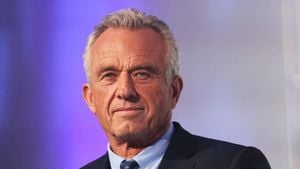With the dust barely settled on his re-election triumph, Florida Senator Rick Scott is laying the groundwork for his next big ambition: to become the Senate Majority Leader. After clinching his seat for another six years, Scott is eyeing the leadership post soon to be vacated by Mitch McConnell, who is stepping down after nearly two decades at the helm.
Despite his prior attempt at leadership—where he garnered just 10 votes—Scott expresses optimism about the changing political climate. He believes the shift within the Republican Party, particularly with Donald Trump's mandate, means there’s room for fresh ideas and approaches. "I've been talking to my Republican colleagues, Guess what? They want change," he stated confidently during an interview with Fox Business.
Scott isn't shy about touting his business acumen, asserting, "They want to be treated as equals. They want to be part of a team. They want to have a working relationship with the House." He believes his experience as a successful business executive gives him the right tools to lead effectively, which he sees as necessary for executing Trump's agenda.
While Scott’s candidacy may be viewed as longshot; his challengers include well-established senators like John Cornyn from Texas and John Thune from South Dakota. The election for the new leader is expected to take place next week, and votes are still being kept close to the chest. Regardless of his uphill battle, Scott maintains optimism about Florida's growing influence within the GOP, declaring, "Florida is the center of the Republican party today and Washington can learn a lot about what Florida has done."
Fresh off his election victory, where he beat Democrat Debbie Mucarsel-Powell by almost 14 percent, Scott made clear his ambitions shortly after. Referring back to his previous attempt to unseat McConnell, he noted, "Two years ago, I challenged Mitch McConnell, because I know there has to be a change. We have a great Republican Party all across this country."
Scott's strategy appears to be built on fostering unity and collaboration within the party. He advocates for the GOP to remain focused on addressing the pressing issues facing the country. He explains, "We need a Republican Party to start solving the problems of this country, and we have significant issues to tackle." His confidence is buoyed by Florida's changing demographics and political leanings and how they reflect on the national scene.
Historically, Scott has been known for his financial prowess, being the wealthiest member of the U.S. Senate with over $300 million to his name. His ability to self-fund campaigns has been both his boon and bane. He spent millions on his past election campaigns, including over $24.5 million this time against Mucarsel-Powell. Yet, he faced challenges as chair of the National Republican Senatorial Committee, where he failed to secure enough seats for the GOP, which continued to cast doubt on his leadership capabilities.
Throughout his political career, he's been embroiled in controversies, including his controversial "Plan to Rescue America," which initially proposed tax liabilities on all Americans. This plan faced substantial backlash even from fellow Republicans, including McConnell, who vowed not to support any agenda raising taxes on half the American population. After revision, Scott insists this plan is pivotal for connecting with voters and has remained steadfast on making necessary adjustments to the GOP’s direction.
Scott's political future hinges not only on his ability to sway fellow Republican senators but also on the potential backing of Donald Trump. An endorsement from the former president could significantly bolster his chances. Scott was one of the earliest supporters of Trump's presidential bid back in 2016 and has remained on his team throughout various challenges, including Trump's recent legal issues.
Despite these efforts, there's been no formal word from Trump yet about backing Scott, leaving many wondering if Scott's connection with Trump will yield the political advantage he needs.
Scott stands at the intersection of opportunity and challenge, embodying the primary push for change from within the GOP. His campaign to lead the Senate is as much about personal ambition as it is about reflecting the voice of the party's base post-Trump. Notably, voters seem eager for leaders who can directly relate to their needs and concerns—an opportunity Scott aims to seize with his candidacy.
His campaign could redefine the GOP’s strategic direction, illustrating Florida's weight within national politics and how its success stories can become models for the party. Scott ended his Election Night address on his trademark hopeful note, saying, "Let’s get to work." With the echo of his statement, many await to see if he can carry this momentum to secure not only votes but also the respect of his colleagues as he moves forward with his ambitions.



